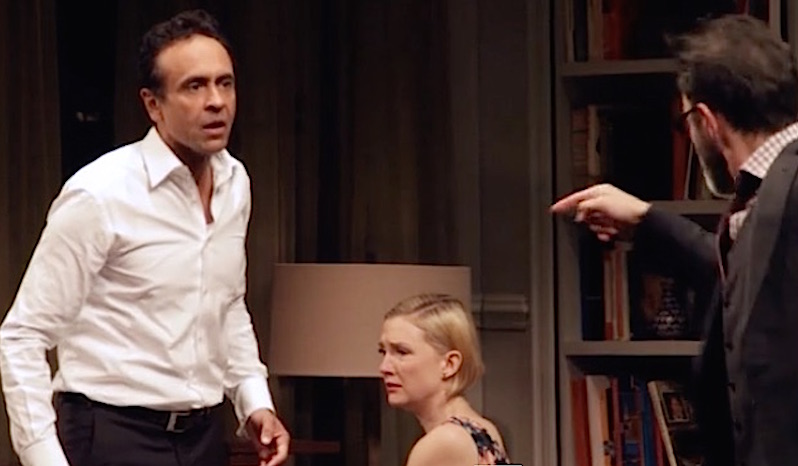Not Dissecting ‘Disgraced’ With the Pulitzer Winner’s Playwright
Ayad Akhtar wants audience members to decide for themselves what his play, about the complexities of identity and hidden prejudices in post-9/11 New York, is saying. Actors Bernard White, left, Nisi Sturgis and Anthony Crane in a scene from "Disgraced." (Berkeley Rep)
Actors Bernard White, left, Nisi Sturgis and Anthony Crane in a scene from "Disgraced." (Berkeley Rep)
Actors Bernard White, left, Nisi Sturgis and Anthony Crane in a scene from “Disgraced.” (Berkeley Rep)
Pakistani-American actor, novelist, screenwriter and playwright Ayad Akhtar knows about the hidden — or not-so-hidden — prejudices many Americans have harbored against people like him since 9/11. For years, Akhtar, who grew up in Wisconsin, didn’t want to explore his heritage in his work, trying instead to write like the European modernists he admired. It was when he started telling stories closer to home that Akhtar hit his stride, with, for example, his 2012 novel, “American Dervish,” about a Pakistani-American boy in Milwaukee coming to terms with his identity, and screenplays including the 2005 “The War Within,” about a man planning a terrorist attack on New York, which Akhtar also starred in.
Akhtar’s first play, “Disgraced,” an explosive story of a Pakistani-American lawyer, Amir, who lives on the upper East Side of New York and hopes to become a partner at his firm, won a Pulitzer in 2013 and was a big hit on Broadway. It’s the most produced play of 2015-16, according to American Theatre Magazine, with performances staged at more than a dozen major American regional theaters, including the Goodman in Chicago, Arizona Theatre Company, Arena Stage in D.C., and Fusion Theatre Company in New Mexico. HBO is also making a movie out of the story, which deals with the complexities of identity and hidden prejudices in post-9/11 New York, coming to a head at a tempestuous dinner party Amir and his artist-wife host.
Akhtar, who lives in New York City, visited California in August for the Djerassi Resident Artists Program, where he spent a month working on the movie version of “Disgraced.” He stopped by Berkeley Repertory Theatre and talked to Truthdig about being an artist rather than a spokesman, how “Disgraced” doesn’t tell us anything about Muslims, and the strong reactions audience members have to the play.
It opened at Berkeley Rep on Nov. 13, when people had just heard about the deadly attacks in Paris a few hours earlier. In response to those horrific events, after the curtain call the actors faced the audience, took one anothers’ hands, and closed their eyes without saying anything — a moving gesture acknowledging and expressing support for the victims of terrorism. “Disgraced” has extended its run at Berkeley Rep until Dec. 27.
Emily Wilson: What was the beginning of “Disgraced”? Did you start with a dinner party?
Ayad Akhtar: I didn’t know what I was writing. It’s like that Faulkner quote: I just follow my characters around and write down what they say. “Disgraced” was the first experience I had where that was happening. I suddenly was in the presence of a character, Amir, who seemed to have his own life and his own voice, and I was just following him. Now, I look back in retrospect and think well, yeah, there was a dinner party in 2006 and, yeah, I did have an idea this would be an interesting setting for a play. But Amir emerged fully formed in a way by himself, and a lot of things I had accumulated found their way into the play, but it wasn’t so conscious.
EW: It was your first play. Why did you want to do it as a play, not a screenplay or a novel?
AA: I have been writing screenplays for a long time, and I had written two novels, but there was something about Amir’s voice, speaking. It was not about describing that voice — it was about describing him to an audience. It felt like it was about him talking in some way. In the first draft it was him talking to the audience. But that got lost, thank God.
EW: Why do you think people responded to it so strongly? Did you expect that?
AA: It was stronger than I thought. I don’t know why — I think people get wrapped up in it for some reason. I think it triggers them. I think it confuses them. I think they are intrigued by the revelations. There are like five places in which every night the audience gasps.
EW: That must be satisfying.
AA: It’s fun. I have an interesting experience with actors who have never done the show before. They come in and say, I don’t understand motivation; why would the person say this? Director Kimberly Senior says, “Just say it — it works.” Then we get up on stage and everything works like clockwork. There’s a laugh at every place we said there would be a laugh, there’s a gasp every place we said there would be one. They come back to me and they go “Wow, I had no idea.” It’s an experience for the audience. It’s constructed that way.
EW: You called “Disgraced” a litmus test. Why do you say that?
AA: I don’t think the play tells you anything about Muslims really because it tells you contradictory things. It tells you three different points of view and the play doesn’t tell which one’s right. It doesn’t tell you anything about America other than that we can’t seem to get along, which everyone knows already. Where do you sit in the not getting along? Do you think there’s a problem or not? Do you think that guy is complaining or does he have a real gripe? All those questions you have to grapple with yourself because the play has not told you. At the Broadway show somebody wrote a blog about the play; some friend had taken them — he was a Tony voter and he needed to see the play — this woman wrote a blog saying she got in an argument after this play, “Disgraced.” The man said to her, “I don’t know if I can be your friend anymore if you like this play because as far as I’m concerned, this play was saying 9/11 was justified and that there should be more attacks against America.” She said in her blog, “I have no idea how he came to that conclusion. That’s not the play I saw.” It’s a common experience for audiences to be polarized. It sort of throws you into your own tribal identification. If you’re willing to look at that, I think it can be a meaningful experience. If not, you think something’s wrong with me or the play or your subscription (laughs). EW: What kind of writer were you trying to be?
AA: I had a high school teacher who changed my life when I was 15, and I always say everything I do is in homage to her — it’s true. She made a very strong imprint and exposed me to a lot of European modernism, and I read so much of that stuff for 15 years that I thought being the best writer I could be was writing like a European modernist, but that was not connected to my subject matter. I wanted to connect with the reader. I wasn’t interested in breaking form — I wanted to tell vivid, absorbing stories. Like Amir in “Disgraced” I feel like I was trying to run from my familial heritage, which frankly almost every American does. But it’s politicized in a post-9/11 America, which is the subject of “Disgraced” — a man who wants to live the American dream who is going about it as every other American generation has, yet somehow he cannot do that. Not only because of his environment, but also because of his own, what the Greeks would call hamartia, or tragic flaw. What’s the tragic flaw of humanity? Always for humans to think they know.
EW: What broke you out of writing like a European modernist?
AA: Failure. Fifteen years of failure. It was awful writing that nobody liked, and I would try a different version, and it was just as bad or bad in a different way. Progress was coming to acquire craft over time. And failing over time realizing what was real and right for me. I wanted to be a writer since I was 15 — I’m 44 now. I’ve been doing this for 29 years now, and the first 17? Really poorly.
EW: Do you feel like people expect you to be the voice of Muslim Americans?
AA: Well, they want me to be. They want it to be a thing, and that’s fine. Not being hemmed in by that demand, and not being dictated to by that demand is an important struggle for an artist. I can never be a spokesman for anything. If I were a spokesman, I would run a political campaign or a nonprofit or I would have started an ad agency. Artists are never spokesmen. At their best, I think they ask questions of us. And hopefully give us some pleasure in the process.
EW: What kind of reactions do you get to “Disgraced”?
AA: They’re all over the board. I got an email from a brilliant Arab playwright I met at the Sundance Lab a few weeks ago. I gave him a copy of the play, and he took it back to the Middle East and read it. He wrote me an email two weeks later, and the email — actually maybe I can just read it to you:
“Hi, I just read ‘Disgraced’ two weeks ago and just the last couple of days I felt I could finally write you about it. When I finished reading it, I felt confused, touched, angry, not knowing what I was supposed to feel, smashed emotionally, amazed. It’s brilliant and what makes it so is that I couldn’t know what character you are hiding behind. I couldn’t know who is speaking on behalf of you in the play. You have succeeded in keeping your thoughts and opinions away from me and I still don’t know what you think about Amir or Islam or America. The play is written and it’s not written at the same time because no one is telling you what to think or be or feel. I am still trying to understand how you did it.”
I think when you get in that uncertain space, and you get afraid — is he saying something bad about Muslims? Is he saying something good? In the postwar generation of Jews in America, something Philip Roth dealt with a lot was, “This is not good for Jews.” And this is a really important time because look at what just happened. You cannot give them a reason to think we are what they think we are. It’s a conversation that goes on in every minority community. That’s not my problem. I have to ask questions that challenge my community — I cannot be an ad guy for my community. And I feel the questions I ask non-Muslims are just as tough.
Your support matters…Independent journalism is under threat and overshadowed by heavily funded mainstream media.
You can help level the playing field. Become a member.
Your tax-deductible contribution keeps us digging beneath the headlines to give you thought-provoking, investigative reporting and analysis that unearths what's really happening- without compromise.
Give today to support our courageous, independent journalists.









You need to be a supporter to comment.
There are currently no responses to this article.
Be the first to respond.